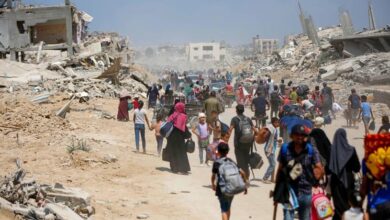The latest on the Israel-Hamas war: Harsh conditions in Gaza, deadly raid in the West Bank

As Israel’s invasion of Rafah stretches into its third week, hundreds of thousands of people fleeing the southern Gaza city have faced miserable conditions in their new camps and shelters.
Gaza residents say shortages of food, clean water and bathrooms have made the relocation experience especially horrifying, and skyrocketing prices have made the trip unaffordable for those people who need transportation, including the elderly and people with disabilities.
Khalil el-Halabi, a retired United Nations official in his 70s who left Rafah last week for Al-Mawasi, a coastal area that Israel designated as a “humanitarian zone,” said know: “We are facing terrible situations.”
“We don’t have what we need,” Mr. Halabi said. “We couldn’t even find water.”
A United Nations official said Monday that more than 800,000 people have left Rafah in the past two weeks. The Israeli army said on the same day that more than 950,000 civilians in the city have been relocated since the country issued an expanded evacuation order. A military spokesman said about 300,000 to 400,000 civilians remained there.
The Latest wave of displacement in Gaza began on May 6 when Israel sent out an evacuation notice and launched military operations east of Rafah, along the border with Egypt. More than half of the area’s civilians have sought refuge in the city – most of them after fleeing fighting elsewhere in Gaza multiple times.
Ali Jebril, 27, a wheelchair basketball player, said he and his family paid $600 to take 35 people from eastern Rafah to Khan Younis by bus earlier this month.
Mr. Jebril, who said his wheelchair could not move in the sandy coastal areas where many people have resettled, moved to a tent on the grounds of a hospital in Khan Younis.
“We are not living a dignified life,” he said. “We are facing a disaster”
He said, the war made him feel like he was a burden to society, often asking others for help.
Since Israel invaded Rafah, overcrowded shelters and tents in the city have largely emptied, said Edem Wosornu, an official with the United Nations office for humanitarian affairs. told the Security Council on Monday. She said people have moved to areas near Khan Younis and Deir al Balah and set up makeshift camps that lack sanitation, water, drainage or shelter.
“We described it as a disaster, a nightmare, like hell on earth,” Ms. Wosornu said. “It’s all of this, and worse.”
Since the start of the war in October, three-quarters of Gaza’s population has been displaced, many four or five times, she said.
Israel issued the order as a humanitarian step to protect civilians from further military action it considers necessary to root out Hamas militants in southern Gaza. However, aid groups say further displacement is making an already dire humanitarian situation worse.
In it Latest updates, the United Nations Office for the Coordination of Humanitarian Affairs described people living in clusters of 500 to 700 tents, many made from blankets, nylon or any other material available. According to reports, some tents were pitched on unstable beach slopes, with trash from higher areas rolling downhill past houses into the sea.
Mr. Halabi said food is available at the market, but his family is so tight that it is difficult to pay.
“After seven months of war, we have almost nothing,” he said.
While the number of commercial trucks entering Gaza has recently increased, aid to the south through the Kerem Shalom and Rafah border crossings has virtually stopped. UNRWA, the main United Nations agency for aid to the Palestinians, said that in the 16-day period to Tuesday, just 69 aid trucks passed through the two border crossings – the lowest rate since weeks. first of the war.
Philippe Lazzarini, head of the UN agency assisting the Palestinians, wrote in a social media post that every relocation is risky and causes heavy damage.
“Each time, they were forced to leave behind what few belongings they had: mattresses, tents, cooking utensils and basic items that they could not bring or pay to transport,” he wrote. “They have to start from scratch every time. ”




